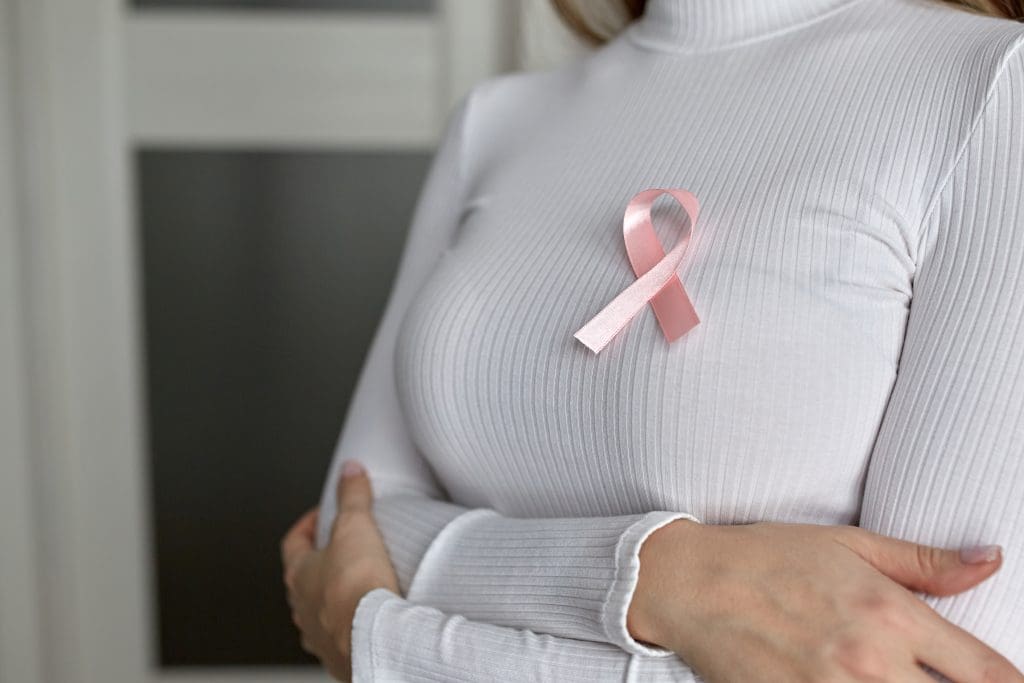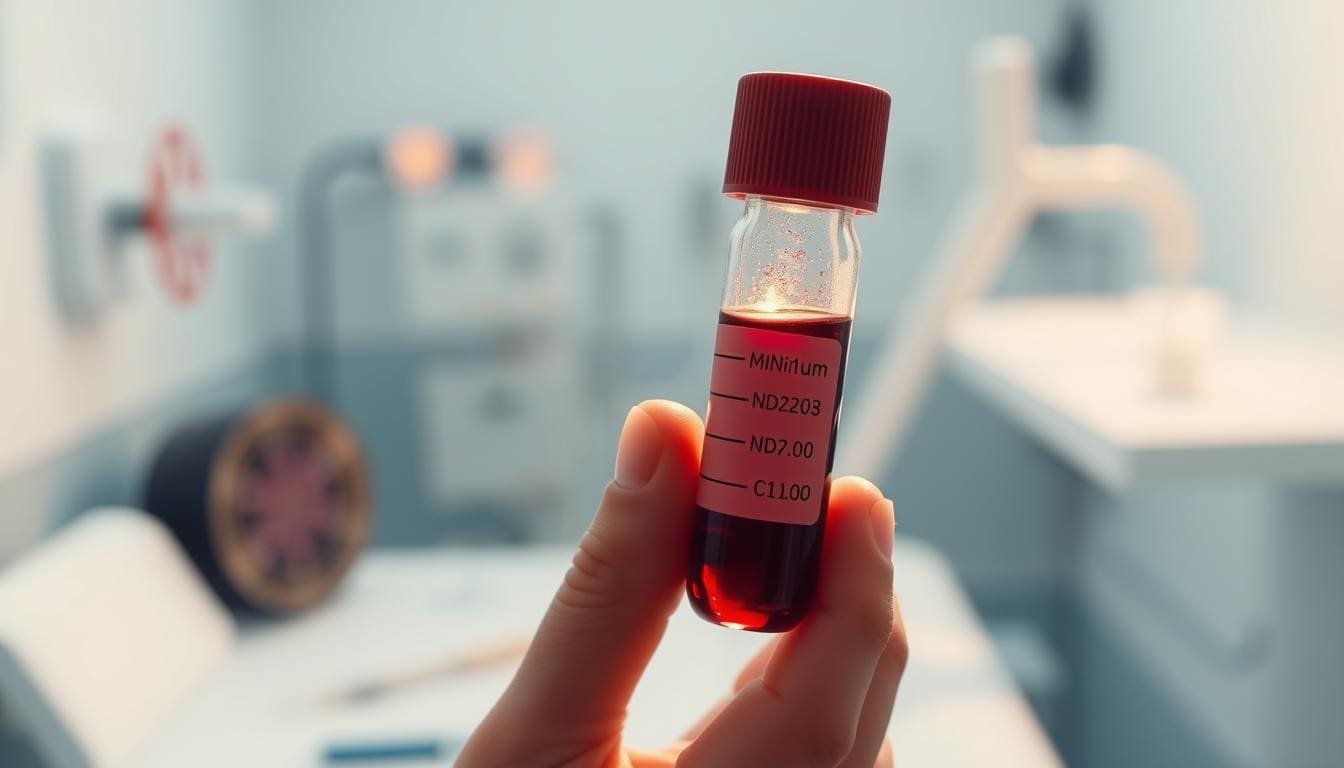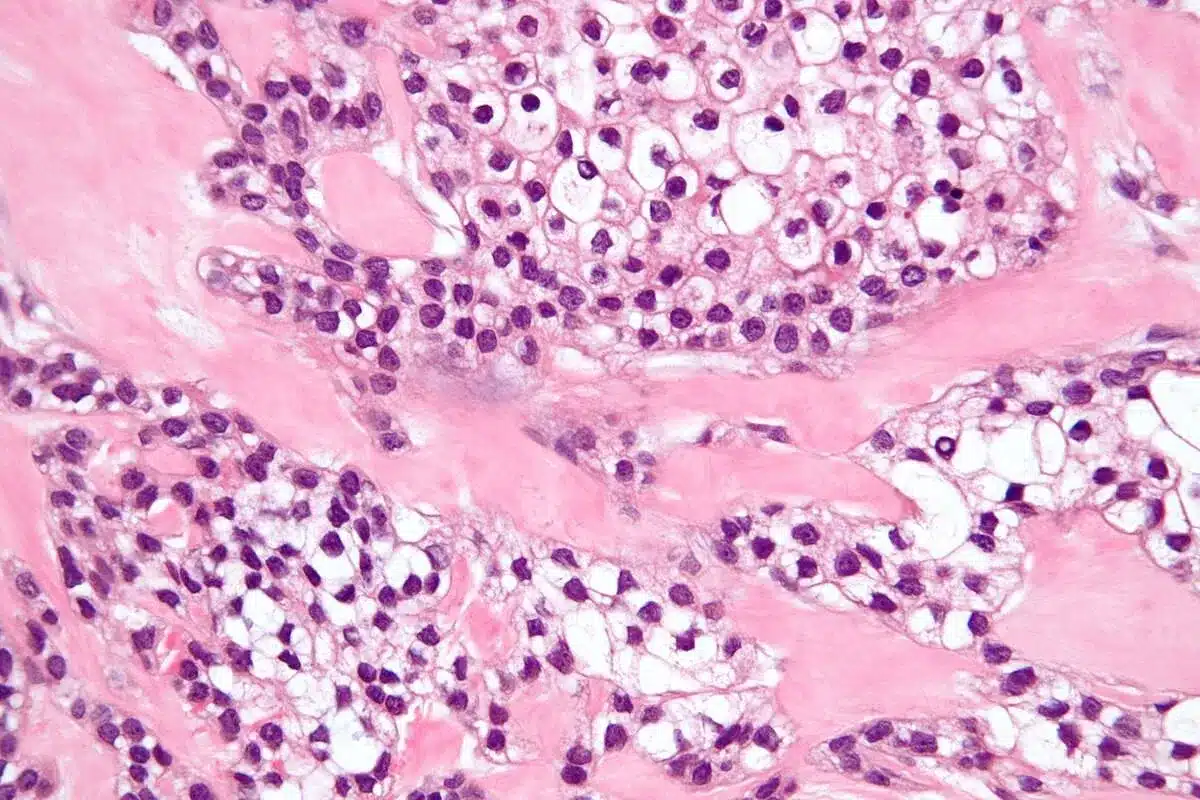Can Stress Cause Breast Cancer? Many people now live with chronic stress, which affects their health. Studies have found a link between stress and health issues, including cancer. But what about breast cancer?
The connection between stress and breast cancer is complex. Researchers are working to understand it. They believe that long-term stress might help breast cancer grow.
Key Takeaways
- Chronic stress may be linked to an increased risk of breast cancer.
- The relationship between stress and breast cancer is complex and not fully understood.
- Understanding the impact of stress on breast cancer is key for better prevention and treatment.
- More research is needed to find out how stress and breast cancer are connected.
- Changing your lifestyle to reduce stress can improve your overall health.
The Science of Stress and Its Effects on the Body

Stress sets off a chain of reactions in our body. When we face stress, our body’s “fight or flight” response kicks in. This releases hormones and chemicals that help us either face the threat or run from it.
How Your Body Responds to Stress Physiologically
The body’s response to stress involves many systems. The HPA axis is activated, releasing cortisol and adrenaline. These hormones increase heart rate, blood pressure, and energy.
Too much cortisol and stress hormones can harm the body. They can weaken the immune system and cause inflammation. Studies show chronic stress can lead to health problems.
Different Types of Stress and Their Health Impacts
There are different kinds of stress, like acute, chronic, and episodic acute stress. Each affects the body differently. For example, chronic stress can harm the heart, metabolism, and even increase cancer risk.
Knowing about the various stresses and their effects is key. It helps us find ways to manage stress better. By understanding stress, we can take steps to protect our health.
The Biological Pathways Connecting Stress to Disease
Stress can lead to disease by affecting our body’s systems. It triggers a series of responses that can harm us.
Stress Hormones and Their Systemic Effects
Stress makes our body release hormones like cortisol and adrenaline. These hormones get us ready to fight or run away. They change how our body works.
Cortisol is key in how we handle stress. It controls blood sugar, metabolism, and our immune system. Too much cortisol can harm us in many ways.
- It can mess with blood sugar levels.
- It weakens our immune system.
- It can hurt our bones.
- It affects how we store fat and metabolize it.
| System | Effects of Chronic Stress |
| Metabolic | Increased blood sugar, changes in fat distribution |
| Immune | Suppression, increased susceptibility to infections |
| Cardiovascular | Increased blood pressure, cardiovascular disease risk |
Inflammation, Immune Function, and Cellular Health
Stress can cause inflammation and weaken our immune system. This can harm our health and increase disease risk, including cancer.
Inflammation is a big part of the stress-disease link. It can damage cells and lead to diseases like heart disease and cancer.
Stress also weakens our immune system. This makes us more likely to get sick and struggle to fight off cancer cells.
Knowing how stress affects our body is key. By looking at stress hormones, inflammation, and immune function, we can understand the stress-disease connection better.
Can Stress Cause Cancer? Examining the Scientific Evidence
Research into cancer causes is ongoing, focusing on stress’s role. The link between stress and cancer is complex. More study is needed to understand how stress might raise cancer risk.
Current Research on Stress and Carcinogenesis
Studies are looking into how stress affects cancer. Chronic stress can change the body’s response, possibly helping tumors grow. It can also weaken the immune system, making it harder to fight cancer.
Key findings include:
- The impact of stress hormones on tumor growth
- Changes in immune function due to chronic stress
- The role of stress in DNA damage and repair mechanisms
Challenges in Studying the Stress-Cancer Connection
Understanding stress and cancer is hard. It’s tough to separate stress’s effects from other risk factors. Cancer biology’s complexity also makes it hard to draw clear conclusions.
Some of the challenges include:
- Difficulty in measuring stress levels accurately
- The need for long-term studies to observe cancer development
- Variability in individual responses to stress
The connection between stress and cancer is complex. More research is needed to grasp how stress affects cancer risk and progression. Scientists aim to find new ways to prevent and treat cancer through ongoing studies.
Breast Cancer: Understanding Risk Factors and Development
Breast cancer develops from a mix of genetic, hormonal, and environmental factors. Knowing these factors helps us understand risk and how to prevent it.
Established Risk Factors for Breast Cancer
Many things can raise your chance of getting breast cancer. These include genetic changes, family history, and lifestyle choices.
- Genetic mutations (e.g., BRCA1, BRCA2)
- Family history of breast cancer
- Personal history of breast cancer or certain non-cancerous breast diseases
- Radiation exposure
- Hormone replacement therapy
- Obesity and lack of physical activity
| Risk Factor | Description | Impact on Risk |
| Genetic Mutations | Mutations in genes like BRCA1 and BRCA2 | Significantly increases risk |
| Family History | Having first-degree relatives with breast cancer | Moderately increases risk |
| Lifestyle Factors | Obesity, lack of physical activity, alcohol consumption | Variably increases risk |
The Process of Breast Cancer Development
Breast cancer starts with normal cells turning into cancer cells. This is due to genetic changes, hormones, and the environment. These cells then grow and form tumors.
Knowing about risk factors and how cancer develops helps in early detection and prevention. While some risks can’t be changed, others can through lifestyle and medical help.
Can Stress Cause Breast Cancer? What Research Reveals
Many researchers are looking into if stress can lead to breast cancer. They are studying both the big picture and the tiny details. Recent studies have given us some clues about the connection between stress and breast cancer.
Epidemiological Studies on Stress and Breast Cancer Risk
Studies have tried to link stress to breast cancer risk. But, the results are not all the same. Some studies found that stress might increase the risk of breast cancer.
A big study in the Journal of Clinical Oncology found something interesting. Women who felt very stressed had a bit higher chance of getting breast cancer than those who felt less stressed.
| Study | Sample Size | Stress Measure | Breast Cancer Risk |
| Meta-analysis (JCO) | 10,000+ | Self-reported stress | Slightly increased |
| Nurses’ Health Study | 50,000+ | Stress questionnaire | No significant association |
| Swedish cohort study | 20,000+ | Job strain assessment | Moderately increased |
Laboratory Evidence on Stress and Breast Tissue
Lab studies are looking into how stress might affect breast cancer. They found that stress can mess with our immune system and hormone levels.
Studies on animals showed that stress can help tumors grow. This happens because stress weakens our immune system and changes the area around tumors.
While big studies show possible links, lab work helps us understand why. Together, they help us figure out if stress can cause breast cancer.
Psychological Stress and Cancer Susceptibility
Psychological stress, from trauma to chronic anxiety, is linked to cancer risk. The connection between mind and body in cancer is complex. It involves many physiological and psychological pathways.
Trauma, PTSD, and Their Relationship to Cancer Risk
Trauma and PTSD can lead to health issues, including cancer. People with PTSD might face a higher risk of some cancers. This could be due to the ongoing stress and body changes PTSD causes.
A study in the Journal of Clinical Oncology showed PTSD increases cancer risk. This is more true for cancers affected by hormones, like breast cancer.
Depression, Anxiety, and Their Impact on Cancer Development
Depression and anxiety are common stress responses. They might also affect cancer risk. While the proof is not solid, studies hint at a link. This could be through immune system changes or unhealthy behaviors.
| Psychological Factor | Potential Impact on Cancer Risk |
| Trauma/PTSD | Increased risk due to chronic stress and physiological changes |
| Depression | Potential influence through immune function changes and health behaviors |
| Anxiety | Possible impact on health behaviors and stress physiology |
It’s key to understand how stress and cancer are connected. This knowledge helps in creating better ways to prevent cancer. More research is needed to uncover how stress affects cancer risk. We also need to find ways to intervene.
Stress-Induced Cellular Changes That May Influence Cancer Risk
When we feel stressed, our cells can change in ways that might lead to cancer. Stress sets off a chain of reactions in our body. These reactions can alter how our cells grow and work.
DNA Damage and Repair Mechanisms Under Stress
Stress can damage our DNA by making more harmful molecules and changing how genes work. DNA damage is a big risk for cancer because it can cause harmful changes in our genes.
- Increased ROS production due to stress
- Altered expression of DNA repair genes
- Genetic mutations resulting from DNA damage
Our body’s ability to fix DNA damage is key to avoiding cancer. But, long-term stress can make it harder for cells to fix DNA problems.
Cell Growth Regulation and Apoptosis
Stress also messes with how cells grow and die. Cell growth regulation keeps our tissues healthy, and apoptosis gets rid of damaged cells that could turn cancerous.
- Dysregulation of cell growth pathways due to stress
- Impaired apoptosis leading to accumulation of damaged cells
- Increased risk of cancer due to accumulation of damaged cells
Learning how stress affects our cells can help us understand its link to cancer. By studying how stress impacts cell growth and DNA, scientists can find ways to prevent cancer.
Does Stress Make Existing Breast Cancer Worse?
Stress and breast cancer are big concerns for patients and doctors. We need to look closely at the evidence. Stress might change how cancer grows and how well treatments work.
Stress and Breast Cancer Progression
Studies show that long-term stress can change how our bodies work. This might make breast cancer grow faster. Stress hormones, like cortisol, can mess with cell growth in tumors.
- Stress can cause more inflammation, which helps cancer grow.
- Stress can weaken our immune system, letting cancer cells spread faster.
- Stress can make cancer cells more aggressive.
Impact on Treatment Outcomes and Recovery
Stress also affects how well breast cancer patients do during treatment. High stress can make recovery harder. It can make it tough to stick to treatment plans and feel good.
- Techniques like mindfulness and meditation can help treatment success.
- Lowering stress can help the body fight cancer better.
- Having a strong support system is key for managing stress during treatment.
It’s important to understand how stress and breast cancer are connected. This helps create better care plans. By managing stress, patients can do better in treatment and feel better overall.
Stress Management Strategies for Breast Cancer Prevention
Research shows a link between stress and breast cancer. Managing stress is key for both mental health and possibly lowering breast cancer risk.
Evidence-Based Stress Reduction Techniques
Many stress reduction methods have been studied for breast cancer prevention. These include:
- Meditation and mindfulness practices
- Yoga and tai chi
- Deep breathing exercises
- Progressive muscle relaxation
Studies show these methods can lower stress and boost well-being. For example, a mindfulness study found a big drop in stress and better immune function.
Lifestyle Modifications to Reduce Stress and Cancer Risk
Changing your lifestyle can also help reduce stress and lower breast cancer risk. These changes include:
| Lifestyle Change | Potential Benefit |
| Regular Exercise | Reduces stress, improves mood, and may lower breast cancer risk |
| Balanced Diet | Provides essential nutrients, supports overall health |
| Adequate Sleep | Helps regulate stress hormones, supports immune function |
| Social Support | Enhances emotional well-being, provides stress relief |
By adding these stress management strategies to your daily life, you can lower stress and possibly breast cancer risk. Always talk to a healthcare professional to create a plan that’s right for you.
Sleep, Stress, and Breast Cancer: The Critical Connection
Research shows that sleep quality is key in managing stress and might affect breast cancer risk. The link between sleep, stress, and breast cancer is complex. It involves many physical and mental factors.
How Sleep Deprivation Amplifies Stress Responses
Not getting enough sleep boosts our body’s stress hormones. This includes cortisol and adrenaline. These hormones can cause inflammation and weaken our immune system. Both can raise cancer risk.
Sleep deprivation messes with our stress hormone control. Studies reveal that long-term sleep loss can cause:
- Higher cortisol levels, linked to stress
- Immune system problems
- More inflammation, which can help cancer grow
“Sleep is essential for the proper functioning of the immune system, and chronic sleep deprivation can have serious health consequences, including an increased risk of cancer.”
Improving Sleep Quality for Cancer Prevention
Boosting sleep quality is vital for lowering stress and possibly reducing breast cancer risk. Ways to improve sleep include:
- Keeping a regular sleep schedule
- Making your bedroom cool and dark
- Staying away from caffeine and screens before bed
Relaxation techniques like meditation and deep breathing can also help. They reduce stress and help you relax better.
By focusing on sleep and using strategies to better it, people can lower their breast cancer risk. This can also improve their overall health.
Different Types of Stress and Their Cancer Impacts
Stress is a big part of our lives today. It comes in many forms, some of which can raise cancer risk. The way stress affects health depends on its type and situation.
Workplace Stress and Its Relationship to Cancer Risk
Workplace stress is a big worry for many. High-pressure jobs can cause long-term stress. Studies show that this stress might increase the risk of some cancers.
Key factors linking workplace stress to cancer risk include:
- Long working hours and shift work
- High levels of job demand and low control
- Lack of social support at work
Relationship and Family Stress Effects on Health
Stress from family and relationships can also harm health. It might even raise cancer risk. This stress can cause inflammation and weaken the immune system, both linked to cancer.
The pathways through which relationship stress affects cancer risk are multifaceted:
- Emotional distress and mental health impacts
- Behavioral changes, such as alterations in diet and sleep
- Potential for increased health-risk behaviors
It’s important to know how different stresses can affect cancer risk. By tackling stress sources and using stress management, we can lower our cancer risk.
The Mind-Body Connection in Breast Cancer Development
The mind-body connection is key to our health. It’s linked to breast cancer development. This connection between our mind and body is being studied to understand its role in breast cancer risk and progression.
Psychoneuroimmunology Research Insights
Psychoneuroimmunology (PNI) studies how our mind and immune system interact. It shows how stress and emotions can impact our immune system. This can affect our risk of getting cancer.
Research also points to stress hormones like cortisol. High levels of cortisol can weaken our immune system. This might increase our risk of cancer.
Emotional Well-being and Breast Health
Our emotional state is tied to our breast health. Studies show that feeling good can protect us from breast cancer. But, stress, anxiety, and depression can raise our risk.
It’s important to manage stress and stay emotionally well. Techniques like mindfulness and meditation can help. They may also help prevent breast cancer.
Supporting Someone with Stress-Related Health Concerns
Supporting a loved one with stress-related health issues needs empathy, understanding, and effective communication. It can be tough to know how to help when someone close to us is struggling with stress’s health impacts.
Stress can cause anxiety, depression, and physical problems like headaches or stomach issues. It’s important to understand stress’s many ways it can affect us to offer the best support.
Effective Communication Strategies
Good communication is key in supporting someone with stress-related health issues. This means active listening, where you focus fully on the person, and accepting their feelings without judging.
- Practice active listening by keeping eye contact and not interrupting.
- Ask open-ended questions to help them share their feelings and worries.
- Don’t downplay their stress or tell them to just “stay positive.”
Using these methods helps create a safe space where your loved one feels heard and valued.
Resources and Support Systems
Along with good communication, connecting your loved one with resources and support systems is very helpful. This can include professional help like therapy or counseling, and support groups where they can meet others facing similar issues.
Encouraging them to do stress-reducing activities, like exercise, meditation, or hobbies, is also important. Also, making sure they have reliable info on managing stress helps them take charge of their health.
| Support System | Description | Benefits |
| Professional Help | Therapy or counseling services | Expert guidance, personalized coping strategies |
| Support Groups | Group meetings for individuals with similar experiences | Community, shared understanding, collective coping strategies |
| Stress-Reducing Activities | Exercise, meditation, hobbies | Reduced stress, improved mood, enhanced well-being |
By combining good communication with access to resources and support systems, you can greatly help someone dealing with stress-related health concerns.
Common Misconceptions About Stress and Breast Cancer
Many people think stress and breast cancer are closely linked. But the truth is more nuanced. The connection between stress and breast cancer has been widely discussed. Yet, it’s important to look at the scientific facts.
Myths About Stress and Cancer Debunked
There are many myths about stress and cancer. One big myth is that stress alone can cause breast cancer. While stress can affect our bodies, there’s no clear proof it directly causes cancer.
Stress and Cancer Risk: Studies have looked into how stress affects cancer risk. But the results are not always the same. Some say chronic stress might make cancer worse, while others find no direct link.
Balancing Concern with Scientific Evidence
It’s key to balance our worries about stress with what science says. Stress management is important for our health. Activities like meditation, exercise, and mindfulness can help lower stress.
By knowing the truth and debunking myths, we can better understand stress and breast cancer. This knowledge helps us make smart choices about our health.
Conclusion
It’s key to understand how stress and breast cancer are connected. This knowledge helps us find ways to prevent breast cancer. Studies show that stress might affect breast cancer risk, making stress management very important.
Using proven ways to reduce stress, like mindfulness and exercise, can help. These methods can lower stress levels and might also lower breast cancer risk. Getting enough sleep and living a healthy lifestyle also boost overall health and help prevent cancer.
The exact ways stress and breast cancer are linked are being researched. But, the evidence so far shows managing stress is vital for health. By focusing on stress management and a healthy lifestyle, we can lower our risk of breast cancer and stay well.
FAQ
Can stress cause breast cancer?
Research suggests chronic stress might increase breast cancer risk. But, the link between stress and breast cancer is complex. More studies are needed to understand it fully.
How does stress affect the body?
Stress releases hormones like cortisol and adrenaline. These hormones can cause inflammation, weaken the immune system, and affect cell health.
Can stress cause cancer?
Current science doesn’t prove stress causes cancer. But, chronic stress might raise cancer risk by causing inflammation and weakening the immune system.
What are the risk factors for breast cancer?
Risk factors include genetic mutations, family history, radiation, and hormonal factors. Knowing these can help lower risk.
Can stress make existing breast cancer worse?
Stress might affect how breast cancer progresses and responds to treatment. It can cause inflammation and weaken the immune system, which can help cancer grow.
What are some evidence-based stress management strategies for breast cancer prevention?
Techniques like meditation, yoga, and deep breathing can reduce stress. Lifestyle changes like exercise, healthy eating, and enough sleep can also help lower breast cancer risk.
How does sleep deprivation affect stress responses?
Lack of sleep can make stress worse. It leads to more inflammation and a weaker immune system, which can increase cancer risk.
Can workplace stress cause cancer?
There’s no clear proof that work stress causes cancer. But, chronic stress at work can increase cancer risk by causing inflammation and weakening the immune system.
How can I support someone with stress-related health concerns?
Good communication, resources, and support systems can help manage stress. This can reduce the risk of related health issues.
What are some common misconceptions about stress and breast cancer?
Some myths say stress directly causes cancer or is the only cause of breast cancer. It’s important to balance concern with scientific facts to understand the complex relationship between stress and breast cancer.
Can depression and anxiety cause cancer?
Depression and anxiety don’t directly cause cancer. But, they can increase cancer risk by causing inflammation and weakening the immune system.
Can stress cause tumors?
Chronic stress might increase tumor risk by causing inflammation and weakening the immune system. This can influence cancer growth.
Can stress trigger cancer cells?
Stress can potentially trigger cancer cells by causing inflammation and weakening the immune system. This can influence cancer growth and recurrence.








